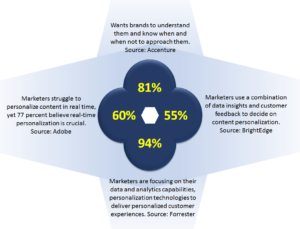Today’s era is ruled by customers and because of their smart networking skills they are termed as hyperconnected customers. With digitization the limitation to gain knowledge and information from various sources has ended and this has empowered customers to make better choices for themselves.
Thus, the industry has entered a phase whereby organizational metrics of success will de dependent on their alignment with customer success metrics. Well, this is supported by our user-friendly Internet, that has created irreversible networking system, accelerating globalization with technological outburst.
With growing opportunity there comes many challenges for marketers to address their message efficiently across wide categories of customer groups with fragmented data of customer experience. Thus, the biggest challenge for marketers is to connect dots and reflect accordingly. To assure no one moves your cheese, differentiate your brand and make it stand elegantly.
Some highlights to make you realize the importance of personalization,

Figure.1: Facts of personalized marketing
Let’s know more about Hyper personalization… it is customer marketing but targeting specific needs. It is advanced marketing where it leverages artificial intelligence (AI) and real-time data to supply more relevant content, products, and service information to every user.
Journey of Hyper personalization as a whole is intense personalization. Applying it to Pharma industry whereby we are stuck at segmentation… is at basic level of Hyper-personalization. Beyond segmentation is behavioral recommendations, omnichannel optimization and predictive personalization.
Top brands like Amazon, Starbucks, Netflix have reached to level of predictive personalization whereby AI & Machine learning analyze our day to day data points which is known as “Big data” comprising of host of factors to power recommendation engine. They have access to data points such as name, requirement, average time spent on search, purchase history, favored brands, etc. using this, they craft a highly personalized email showing you relevant items.
Unknowingly, Pharma industry is moving towards personalization, whereby wearables, ingestibles, implantables are assisting in monetizing disease management programs at individual level. The model that helps us to do so is Ecosystem model. Ecosystem model allows you to focus on customer needs and help you to understand patient engagement, multi-channel and omni-channel communication strategies, sensors combined with patient data to predict future specific conditions are moving towards hyper personalization. What we need is to tap data points, whereby health data which can be actually termed as “Big Fit data” which will help us to deliver personalized solutions.
So, writing on the wall to Accept Reality, Reimagine & Transform IT & AI skills.
Author:
Dr. R B Smarta- CMD Interlink Marketing Consultancy
Ms. Titiksha Shinde- Associate Consultant- Interlink Marketing Consultancy
References: https://webengage.com/blog/hyper-personalization-marketing-future/
*******
